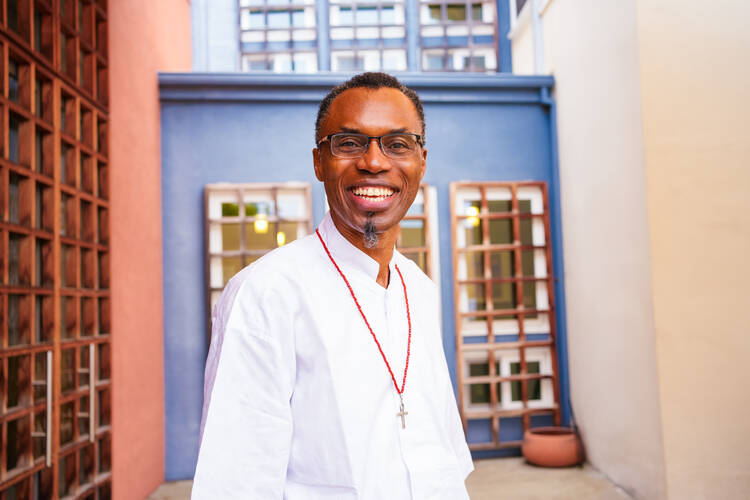Editor’s note: For today’s Synod Diary, we share a guest entry from Agbonkhianmeghe E. Orobator, S.J. Father Orobator is a Nigerian Jesuit, the dean of the Jesuit School of Theology of Santa Clara University and is a voting member of the Synod on Synodality.
As I write this, the second session of the Synod on Synodality is about to convene at the Vatican, continuing Pope Francis’ bold agenda of synodality as the path forward for the church in the 21st century.
Amid the flurry of activities between this and last year’s sessions, there has been no lack of controversy, cynicism and skepticism. One source of doubt relates to the decision to separate the synod as “a process” from the synod as “space to tackle vexing issues,” assigning the latter to 10 synod-adjacent study groups. Effectively, this move has created what seems like a parallel track.
While some critics argue that the opaque process for selecting study group members raises questions about the organizers’ sincere intentions, there is hope that the opportunity for an in-depth study of consequential matters will benefit and enrich the synodal process in the long run.
Notwithstanding, it is worth recalling that the value of a synod does not lie in its capacity for solving problems. As an assembly of the people of God, the synod must deepen the foundational practices of building a synodal church—listening, dialogue and discernment under the guidance of the Holy Spirit. No synod will ever completely exhaust the issues under consideration or adequately resolve contentious matters.
Overcoming, for example, the deep-seated pathologies of clericalism, sexual abuse and patriarchy in the church requires strategies and processes extending well beyond a synodal assembly. The synod offers an opportunity to experiment with ways of dealing with issues over which differences and disagreements exist. It is a way of being church, of living and working as the people of God.
Synodality makes a room large enough to accommodate differences, celebrate gifts and allow pathways for the Spirit to birth new things among the people of God. We may not all agree, but it is important that we stay at the table of conversation, dialogue and discernment.
Synodality creates an inclusive space for all baptized Christians to feel welcomed, valued and respected. Regardless of their status, position or identity, all are part of the church’s communion, and their baptismal dignity affirms their equal right to participate and contribute to the church’s mission.
The path ahead will be challenging. A synod is a journey whose path is constructed by the people of God walking together under the inspiration of the Holy Spirit. This particular synod is a pivotal moment on that journey.
Here’s the latest news from in and around the synod hall:
- At today’s synod press conference, Monsignor Anthony Randazzo, the bishop of Broken Bay, Australia, and president of the Federation of Catholic Bishops’ Conferences of Oceania, expressed his frustration that the discussions of “niche” issues, like women’s ordination to the diaconate, tend to neglect or exclude the most vulnerable people. He said women deacons have become a “hot button” issue for the church, and “as a consequence, women who in many parts of the church and world are treated as second-class citizens are totally ignored. This is scandalous…all because a small minority with a large, powerful Western voice are obsessed with pushing this issue.” – Ashley McKinless
- The Ecclesial Conference of the Amazon (CEAMA) and the organization Discerning Deacons co-sponsored a panel in Rome’s Pope Pius XI Hall in Rome’s Trastevere neighborhood. The panel featured reflections on ecological justice, Indigenous peoples and pastoral ministry from women in active ministry in Brazil, the United States, Canada and Australia, as well as a welcome from Cardinal Pedro Barreto, 79, the archbishop of Huancayo in the Central Andes mountains of Peru. The panelists were part of a delegation of women’s ministry advocates who met with Pope Francis on Monday, Sept. 30. – Zac Davis








